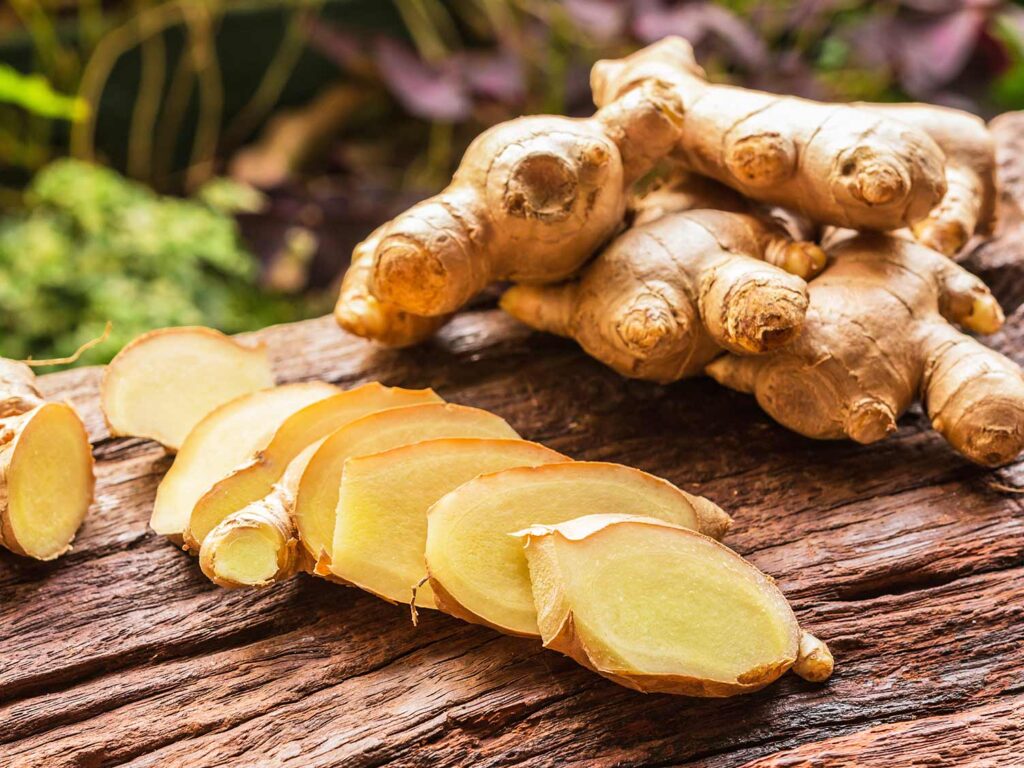Do you know why ginger is seen as a superfood for digestion, not just a tasty spice? It comes from the root of Zingiber officinale. Its taste and smell make dishes exciting. Ginger helps health, especially digestion.
Gingerol is the main active part of ginger. It makes food move quicker through our gut. This speeds up how fast we digest food, reducing bloat and gas. It helps with feeling sick, like in the mornings or after chemotherapy. Ginger also fights harmful free radicals, which can help with swelling in conditions like arthritis.
You can have ginger in many ways: fresh, as a powder, in tea, or as a pill. Fresh ginger tastes strong and is very good for you. Powdered ginger is easy to use and not as strong. No matter how you have it, ginger adds flavour and health benefits to your meals.
Key Takeaways
- Ginger enhances digestive processing and reduces bloating and gas.
- Active compound gingerol improves gastrointestinal motility.
- Ginger provides relief from nausea, including during pregnancy and chemotherapy.
- Antioxidants in ginger help manage free radicals and offer anti-inflammatory benefits.
- Available in several forms, ginger can be easily incorporated into your diet for numerous health benefits.

The Origins and History of Ginger
Ginger comes from Southeast Asia and is part of the Zingiberaceae family. It’s related to turmeric and cardamom. People have loved ginger for its taste and health benefits for a long time. This spice comes from the ginger root and is used in many medicines around the world.
An Ancient Spice
Ancient Chinese people first used ginger around 400 BC for its healing powers. They believed it could help with many health problems like colds and arthritis. It was even used to fight inflammation and stomach ulcers.
Traditional Uses Across Cultures
Ginger is known and loved worldwide, not just for cooking but as a medicine, too. In India’s Ayurveda, it’s seen as a spice that warms the body, helps digestion, and increases blood flow. In China and Japan, it’s in many dishes and teas. These foods help both taste and health.
The Nutritional Composition of Ginger
Ginger is not just a spice; it’s packed with important nutrients. It has over 400 different compounds that are good for your health. Knowing more about its ginger composition lets you understand its benefits better.

There are many reasons why ginger is good for you. It has a lot of carbohydrates, giving you energy. It also has lipids, terpenes, and ginger compounds like gingerols and shogaols. These compounds give ginger its strong smell and taste.
Key Nutrients in Ginger
Ginger offers vital nutrients like amino acids, fibre, and phytosterols. It also has important vitamins, including nicotinic acid. These ginger nutrients boost the value of meals. Gingerol, a bioactive component, stands out. It fights inflammation and acts as an antioxidant. This makes ginger good for your health in a variety of ways.
Volatile and Non-Volatile Compounds
Ginger’s health benefits and unique taste come from its compounds. These include volatile and non-volatile ingredients. Gingerols, shogaols, and a compound called zingerone are key. They support your health and help prevent diseases. This shows how ginger isn’t just a spice; it’s medicine too.
How Ginger Supports Digestive Health
Adding ginger to your daily life can greatly boost your gastrointestinal health. It brings many digestive benefits. This natural remedy solves key digestive issues and keeps you healthy.
Improving Gastrointestinal Motility
Ginger makes the digestive system work better. It speeds up how food moves through your body. This means food spends less time in your stomach, helping with indigestion and making digestion smoother.
Reducing Bloating and Gas
Ginger helps with bloating and gas. Its ingredients, like gingerol, relax the stomach and lessen discomfort. Eating ginger often reduces bloating and gas, making your digestive system feel better.
Relief from Indigestion
Ginger is good for those with upper stomach pain. Research shows ginger can ease indigestion when taken daily. This happens because of gingerol and shogaol, which make the digestive system work better.
Adding ginger to your meals is great for easing indigestion and keeping your gastrointestinal health strong. It has natural benefits that work well.

Ginger’s Role in Nausea Relief
Ginger is well-known for easing nausea. It’s a natural aid used in many situations, such as during pregnancy or chemotherapy. Because of this, ginger is highly respected as a natural remedy.
Managing Morning Sickness
For expectant mothers, finding ways to reduce morning sickness is a top priority. Ginger stands out as a favourite, praised by experts. It avoids the usual drawbacks of medicines and is easy to use in tea, supplements, or fresh slices.
Chemo-Related Nausea
Nausea is a common issue after chemotherapy. Ginger is a gentle but powerful option to help manage this. Studies support its use in lessening nausea and vomiting after treatments, making it a valuable aid.
Aside from pregnancy or chemo, ginger also helps with nausea for other reasons. Its effectiveness in so many cases proves its worth as an ancient and reliable treatment.
Anti-Inflammatory and Antioxidant Properties of Ginger
Ginger is more than just a spice. It’s known for its powerful health benefits too. Its active compounds, like gingerol, have strong anti-inflammatory and antioxidant effects. This means ginger can help fight off oxidative stress and lower inflammation levels.
Fighting Free Radicals
Gingerol in ginger serves as a strong antioxidant. It works to stop free radicals which can damage cells. By eating ginger often, you can help your body protect itself. This promotes better health overall.
Potential Benefits for Arthritis
Ginger’s anti-inflammatory effects may offer relief for arthritis. Studies show it can reduce pain and boost movement in people with osteoarthritis, especially in the knee. By lessening inflammation, ginger aids in joint health and eases arthritis symptoms. It’s a natural, supportive treatment for these long-term health issues.
Ginger in Weight Management
Ginger is becoming popular for helping with weight loss. Recent research looks at how effective ginger for weight loss is. It has been shown that ginger can help reduce body weight, waist-hip ratio, and body fat in those with obesity.

There are several ways ginger helps in weight management. Its anti-inflammatory properties can reduce inflammation linked to weight gain. Ginger also improves metabolism, helping burn calories more effectively. This is key in managing obesity with ginger. Moreover, it seems to make your body burn calories faster by raising your temperature and metabolism.
To wrap up, adding ginger for weight loss to your diet can be a good, natural way to control your weight. Thanks to its anti-inflammatory and metabolism-boosting effects, ginger is a hopeful choice for those wanting to reach a healthy weight.
How to Incorporate Ginger into Your Diet
Adding ginger to your meals is not only easy but also healthy. It fits into many food cultures, from drinks to tasty meals. Let’s explore how to use this versatile spice.
Tea and Beverages
Ginger tea is a great way to enjoy ginger’s benefits. Slice fresh ginger and steep in boiling water for a warm drink. Add lemon, lime, or honey to make the taste even better. You can also use ginger in iced teas and smoothies for a cold option.
Cooking with Fresh and Dried Ginger
Fresh ginger adds a lively taste to dishes, sweet or savoury. It pairs well with fruits, stir-fries, and marinades. Dried ginger works in recipes like curries, baked goods, and soups. This makes cooking with ginger fun and delicious.
Supplement Considerations
Ginger supplements offer an easy way to get ginger’s benefits. But, be careful as the quality can vary a lot. It’s best to get ginger from your meals. If you do use supplements, talk to a doctor first.
Safety and Side Effects of Ginger
Ginger is mostly safe, but don’t take too much. Large amounts, especially in supplements, can cause stomach problems and heartburn.

Moderate Consumption
For most people, using ginger carefully is fine. But, too much might make you bleed more, especially if you’re taking certain medicines. So, be sure to use it in moderation.
Potential Interactions
Ginger might not be good with some medicines or health issues. It can affect blood sugar levels, so if you take insulin, be careful. Always talk to a health expert before changing your ginger intake a lot.
Talking to your doctor can help you use ginger safely. This way, you can avoid any bad effects and still enjoy its benefits in your diet.
Comparing Fresh Ginger and Ginger Powder
Fresh ginger and ginger powder both have their special uses. The one you choose depends on what you need it for. It might come down to what’s easier for you, or what flavour you prefer.
Benefits of Fresh Ginger
Fresh ginger is full of flavour and has a lot of healthy components. It’s rich in gingerol, which helps fight inflammation and works as an antioxidant. This makes fresh ginger great for your health. It also adds a strong, spicy taste to food, improving most recipes.
Convenience of Ginger Powder
Ginger powder is super easy to use. You don’t have to peel or chop it. It lasts a long time, so you can always have it ready. Ginger powder is best for baking and in foods where you want a lighter ginger taste. So, it’s a good choice for simple cooking and staying healthy.
Conclusion
To sum up ginger’s benefits, it’s clear this spice is great for your health. It comes from the Zingiber officinale plant. Ginger helps your stomach work better. It reduces bloating and helps with gases. This all makes it perfect for anyone wanting to feel better after eating.
Ginger is amazing for stopping sickness too. It’s a natural way to feel better if you’re pregnant or having chemotherapy. And unlike some drugs, it has no bad side effects. Ginger is also good at fighting inflammation. This makes it useful for people with arthritis.
Ginger is packed with healthy stuff like gingerol and shogaol. These make it good for you. You can use fresh or powdered ginger in your cooking. Both add great tastes and good health. Fresh ginger has a strong taste and more gingerol. But powdered ginger is handy and tastes mild, still giving lots of benefits. Ginger is used worldwide in food and medicine.
Ginger is so useful in many ways that everyone should add it to their diet. More and more, science shows how good it is. So, using ginger as food or as a remedy is a great choice for your health. It connects healthy eating with feeling good all round. Adding ginger in your life is a step towards better health and a happier you.

